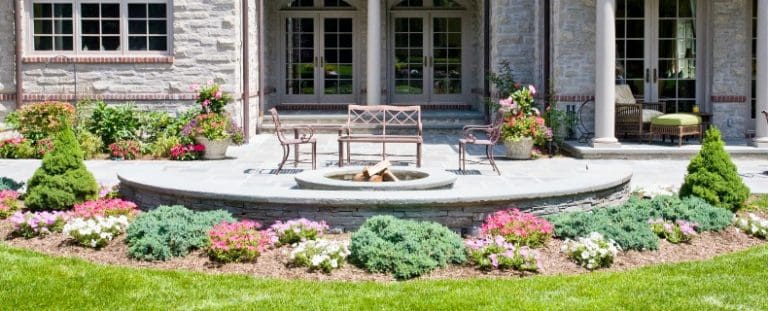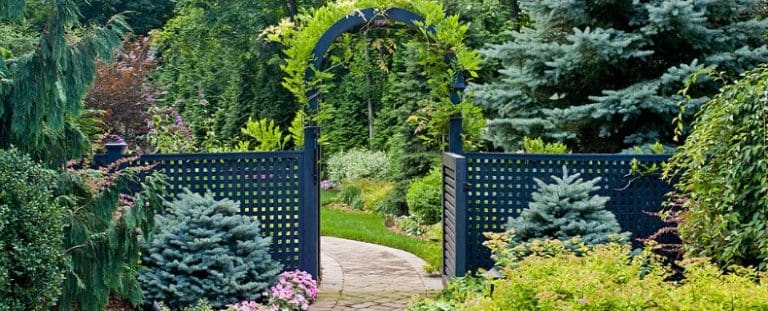To keep your home looking great, you have to pay attention to lawn care and maintenance. A poorly maintained landscape can ruin your home’s curb appeal, lower property values and create a variety of lawn problems that can affect your property and your family. By hiring a professional lawn care company in NJ, you can prevent problems and keep your home looking its best year-round.
Like most homeowners, you want a lush green lawn that reflects a well-maintained home, but don’t have the time for extensive lawn care. Getting a healthy, lush lawn takes endless hours of work and commitment on a regular basis.
Take a look at top 6reasons to hire a professional lawn care company.
1. Provide Regular Lawn Care and Maintenance
 Regular maintenance is essential to a beautiful, healthy landscape. Without it, your landscape can become quickly overgrown and create an eyesore for your home’s appearance. Professionally trained crews, such as the team at Borst Landscape and Design, provide weekly maintenance services.
Regular maintenance is essential to a beautiful, healthy landscape. Without it, your landscape can become quickly overgrown and create an eyesore for your home’s appearance. Professionally trained crews, such as the team at Borst Landscape and Design, provide weekly maintenance services.
An overgrown landscape not only looks bad, but it also invites many types of lawn diseases, insects and pests to your property. To keep your landscape healthy and well-maintained, it’s important to plan for regular maintenance that includes:
- Weekly lawn mowing
- Watering
- Weed control
- Fertilization and planting
- Border edging for driveways and walkways
- Cleaning of all hardscaped surfaces like patios, walkways and driveways
- Cleaning of plant and flower beds
- Clearing of dead growth and debris
- Tree, shrub and plant care
2. Weed Control
 Regular lawn care and maintenance services will keep weeds to a minimum, but herbicide treatments may be required to eliminate them and keep them from returning.
Regular lawn care and maintenance services will keep weeds to a minimum, but herbicide treatments may be required to eliminate them and keep them from returning.
Most weeds are aggressive invaders and hardy growers that will invade your lawn at the first opportunity. Lawns that are ill-maintained, improperly watered and lack adequate nutrients will create easy targets for weeds to flourish.
Weeds fall into two main categories: broadleaf weeds and grassy weeds.
- Broadleaf Weeds – Broadleaf weeds have wider leaves and include varieties like dandelions, chickweed, purslane, thistle, and clover. While some broadleaf weeds bloom and can be confused for flowering plants, they are still weeds and should be eliminated.
- Grassy Weeds – Grassy weeds usually grow closer to the ground. They spread rapidly and can quickly take over your lawn. Varieties that include crabgrass, dollarweed, perennial creepers and creeping charlie will rob your grass and soil of moisture.
- Thatch – Thatch is a mat of yellowish dead grass that blocks moisture and air in your lawn and prevents healthy grass growth. It spreads quickly and is difficult to get rid of. For proper de-thatching, it’s best to hire professional lawn care companies NJ with knowledge about de-thatching procedures and the right equipment.
3. Mulching
 Mulching is a simple, inexpensive way to provide extra benefits to your lawn, landscape and garden areas. It provides a protective layer of material on top of the soil that offers many advantages for healthy root and plant growth.
Mulching is a simple, inexpensive way to provide extra benefits to your lawn, landscape and garden areas. It provides a protective layer of material on top of the soil that offers many advantages for healthy root and plant growth.
Mulch will benefit your lawn and plants with added protection they need to thrive year-round. Talk to your lawn care company in NJ about the benefits of mulch.
Some of the benefits that come from mulch include:
- Moisture retention in the soil
- Reduced water needs
- Even soil temperatures
- Less soil erosion
- Less soil compaction
- Less weed growth
- Well-manicured appearance
4. Fertilization
 All lawns need proper nutrients to stay healthy, lush and green, but they need the right nutrients at the right time of year to grow and thrive. It takes a lot of energy for your lawn to develop a healthy root system and produce new growth. Most soils lack adequate nutrients to provide this, so proper fertilization is essential especially during spring, summer and fall growing seasons. Fertilization promotes healthy, stable roots underground that encourage new leaf growth and a thriving lush lawn.
All lawns need proper nutrients to stay healthy, lush and green, but they need the right nutrients at the right time of year to grow and thrive. It takes a lot of energy for your lawn to develop a healthy root system and produce new growth. Most soils lack adequate nutrients to provide this, so proper fertilization is essential especially during spring, summer and fall growing seasons. Fertilization promotes healthy, stable roots underground that encourage new leaf growth and a thriving lush lawn.
Typical fertilization schedules include:
- Late Spring – In late spring after new growth is abundant, your grass uses a lot of stored energy to continue healthy growth. This is also the time when weeds love to invade your lawn and soak up all the nutrients in your soil. Proper fertilization techniques and products prevent weed growth and promote healthy, natural weed control.
- Summer – Summer brings hot weather, lack of rainfall and lots of outdoor insects and pests to your lawn. Summer fertilization schedules help to provide extra nutrients in times of increased lawn stress and outdoor insects. If you have a warm-season grass, summer fertilization will encourage healthy fall growth.
- Early Fall – Fall brings milder days and cooler temperatures, but it also brings dead summer growth and lack of soil nutrients. As colder temperatures arrive, your lawn may get brown spots or dead patches of grass. Fall is an especially important feeding time to replenish soil nutrients and strengthen your grass, so it can survive the upcoming winter.
- Late Fall – A late fall application is granular instead of liquid, so that it breaks down more slowly throughout the winter months. This promotes growth in the beginning of spring.
5. Aerate Your Lawn
By aerating your lawn, you can promote good drainage and airflow to keep your lawn green and healthy year-round. Lawn aeration, perforating the soil with small holes, allows water, air and nutrients to penetrate turf roots. This promotes deeper root growth, thicker, stronger grass growth and less soil compaction. The best time to aerate your lawn is in the Spring when new growth is developing. This will give your grass plenty of time to heal and fill in any open areas after soil plugs are removed. Cool-season grasses, typical in Northern NJ lawns, are usually aerated in the early Spring or Fall. Lawn aeration can be done with two types of tools – a spike aerator and a plug aerator. You can aerate your own lawn, but it’s a difficult and tedious process. Hiring lawn care companies NJ with aeration knowledge, experience and proper equipment will give you the best results.
6. Plant the Right Grass
Climate and weather conditions, soil type and light conditions have a big impact on the growth patterns and root systems of grass, so it’s important to plant the right type of grass for your existing landscape conditions.
Grasses are divided into two types – cool-season grasses and warm-season grasses.
- Warm-Season Grasses – Warm-season grasses grow best in late spring and summer. They like mild winters and summers that are hot, humid and dry and grow best in areas with 20 inches or less of yearly rainfall. Warm-season grasses like buffalo grass, Bermuda grass, St. Augustine grass and zoysia are typically found in the southern and western regions of the country where temperatures are temperate and mild year-round.
- Cool-Season Grasses – Cool-season grasses grow best in fall, winter and early spring. They like mild, wet winters and do well in colder weather with snow and ice. They like summers that are warm or hot, but not dry and grow best in areas with at least 30 inches or more of rainfall each year. In Northern NJ, cool-season grasses like bluegrass, perennial ryegrass, fine and tall fescues and wheat grass are common.
Whether your Northern New Jersey lawn is small or large, flat or hilly, terraced or sloped, a professional lawn care company in NJ can help you keep it looking great year-round.
